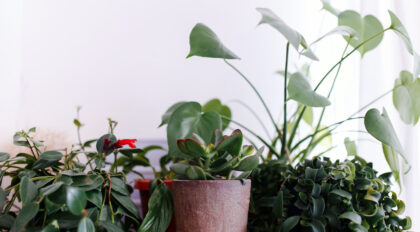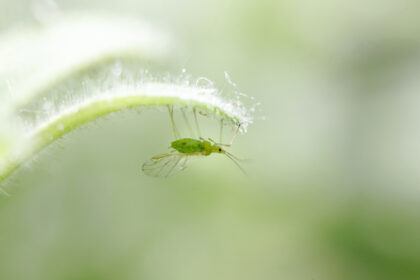How to Remove and Prevent Houseplant Pests + 3 Common Pests and How to Get Rid of Them
Adding some greenery and picking up the healthy hobby of indoor gardening is supposed to be a relaxing experience. But when those houseplants become riddled with indoor pests it can be a hassle and add stress to an otherwise relaxing hobby.

No one likes pests. Fleas, ants, ticks, and other creepy crawlies are a nuisance that can be a pain to deal with. If you aren’t familiar with houseplant pests, it can be difficult to figure out how to get rid of them.
Whether they hitch a ride in or sneak in later, it can be a pain getting them out. to help keep your plants healthy and pest-free we’ve compiled this short list of common houseplant bugs and steps you can take to get rid of them.
How to Remove and Prevent Houseplant Pests
Removing Bugs
When it comes to removing pests from your houseplants it’s crucial that you handle them with care. Being too forceful or using the wrong solutions can damage your plants. While some houseplant pests are more tenacious than others, be gentle when removing or wiping bugs away.
Methods for Removing Pests
When you discover a new pest on your plants, the first thing you want to do is assess the situation. Take note of how many there are and where they are. Are they under the leaves or on the stalk? Infestations that have infiltrated the soil may require replanting, as larvae in the soil have the potential to invade a plant’s root system.
Wiping: In many cases you can use a damp cloth or one dipped in an alcohol or insecticide solution to remove pests. This method is especially effective for pests that don’t cling to your plant as much, like aphids.
Hand-removal: Some bugs like scale are easier to remove using your nails or hands. Gently use a nail to peel bugs away from the stalk and put them into soapy water.
Prevention
Once you’ve gotten rid of the insects you can see, it’s time to take steps to prevent future infestations from occurring. There are several methods for presentation that don’t involve heavy chemicals.
Neem oil and essential oils: Neem oil is a go-to natural insecticide that’s effective in deterring aphids, leaf miners, ants, and even certain types of fungus. Another benefit of neem oil is that it isn’t toxic to cats or dogs, making it a preferable option to certain essential oils like peppermint.
Castile Soap: Castile soap is also an effective insect repellent. When mixed into a water solution and sprayed directly onto insects it dissolves the outermost layer of their protected bodies.
This video has a great tutorial on making your own castille soap spray mixture for your plants.
Common Houseplant Pests and What to Do About Them
Gnats
Fungus gnats, to be exact. If you’ve been a plant owner for any length of time you may have noticed a slight uptick in the number of gnats in your home. These little buggers feed off of the decomposing matter found in over-moistened soil.
Having one or two fungus gnats isn’t going to do more than annoy you. However, larger infestations can wreak havoc on your plant’s root systems.
Avoiding these types of infestations and deterring fungus gnats can be solved by using well-draining soil and avoiding overwatering.
Aphids

You may recognize aphids as small green or black bugs you see outside. Unfortunately, when these pests come indoors they can feed off of your plant’s sap, causing issues like yellowing and abnormal growth.
Wiping with alcohol-dipped swabs is the best way to help get rid of these pests. You can also spray them with water, but this method usually works best with heartier, well-established plants (i.e. not delicate houseplants).
Related Reading: How to Get Rid of Aphids Naturally
Leafminers
If you’ve seen trails cropping up on your plants leaves, it’s likely that you may have a leafminer problem. Leafminers is an umbrella term that refers to a variety of different kinds of bugs that eat away at your leaves, leaving these trails behind.
When you notice these trails, the best course of action is to remove them as soon as possible to keep these insects from spreading to other areas of the plant.
If you have questions about what soil is right for your gardening needs, our knowledgeable staff at Walrath can help. Come in and ask us about the benefits of different types of soil for all types of gardening.
You can also send us an email with your specific questions!







